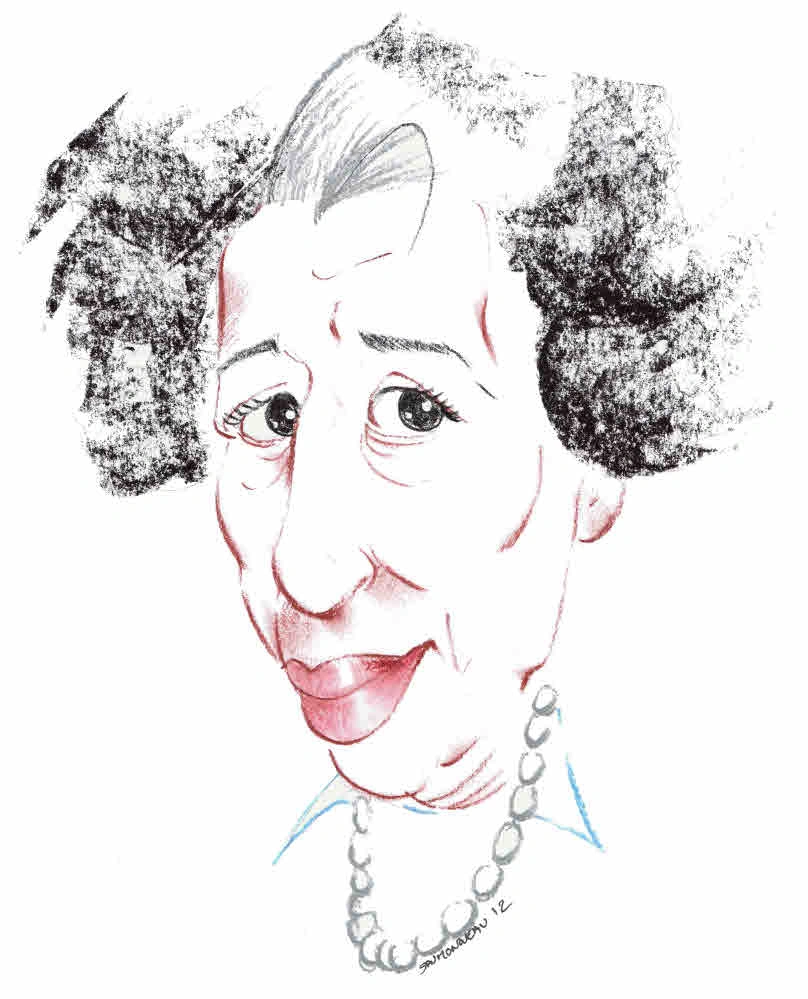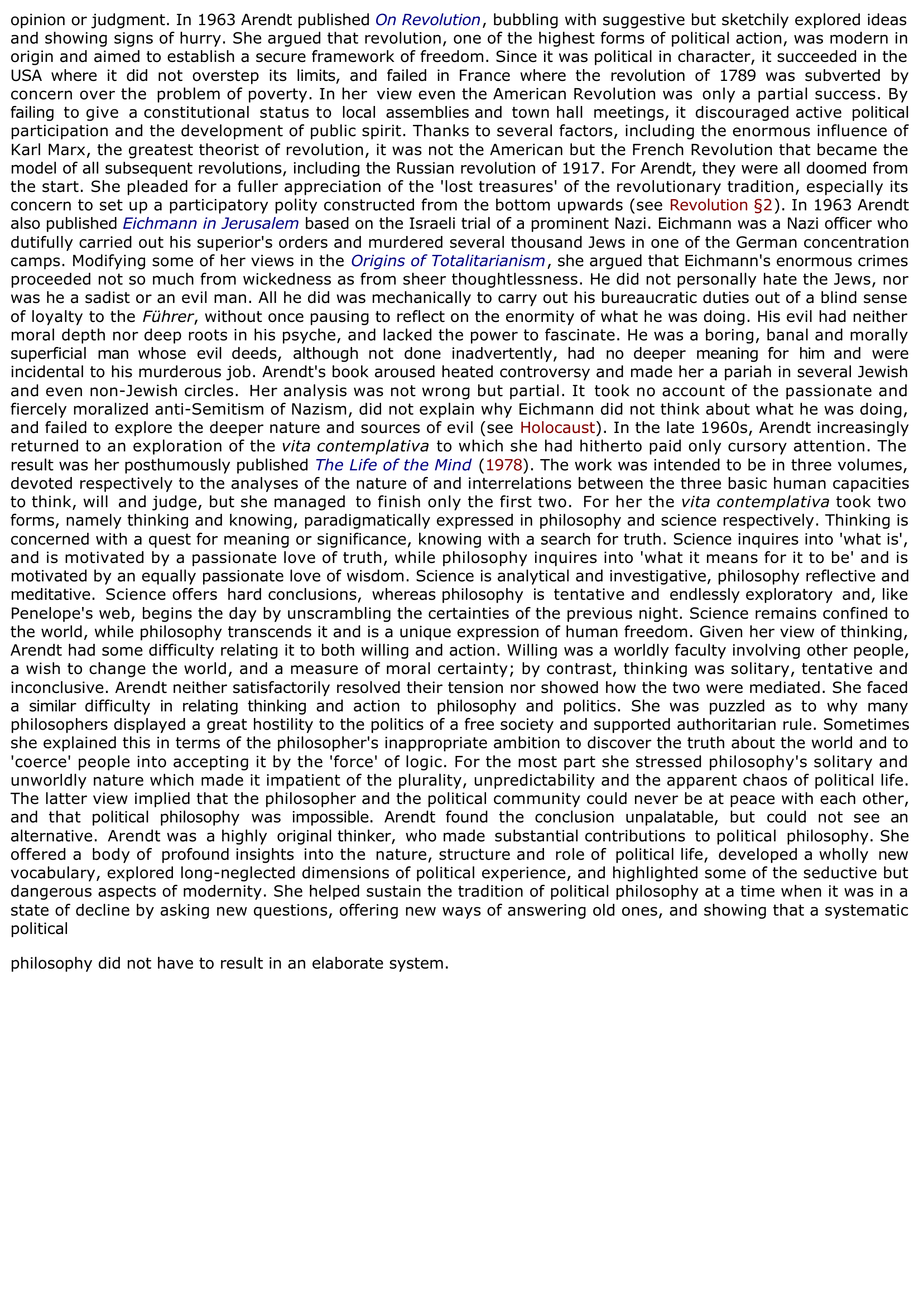Arendt, Hannah (présentation en anglais)
Publié le 20/01/2010
Extrait du document


«
opinion or judgment.
In 1963 Arendt published On Revolution , bubbling with suggestive but sketchily explored ideas and showing signs of hurry.
She argued that revolution, one of the highest forms of political action, was modern inorigin and aimed to establish a secure framework of freedom.
Since it was political in character, it succeeded in theUSA where it did not overstep its limits, and failed in France where the revolution of 1789 was subverted byconcern over the problem of poverty.
In her view even the American Revolution was only a partial success.
Byfailing to give a constitutional status to local assemblies and town hall meetings, it discouraged active politicalparticipation and the development of public spirit.
Thanks to several factors, including the enormous influence ofKarl Marx, the greatest theorist of revolution, it was not the American but the French Revolution that became themodel of all subsequent revolutions, including the Russian revolution of 1917.
For Arendt, they were all doomed fromthe start.
She pleaded for a fuller appreciation of the 'lost treasures' of the revolutionary tradition, especially itsconcern to set up a participatory polity constructed from the bottom upwards (see Revolution §2 ).
In 1963 Arendt also published Eichmann in Jerusalem based on the Israeli trial of a prominent Nazi.
Eichmann was a Nazi officer who dutifully carried out his superior's orders and murdered several thousand Jews in one of the German concentrationcamps.
Modifying some of her views in the Origins of Totalitarianism , she argued that Eichmann's enormous crimes proceeded not so much from wickedness as from sheer thoughtlessness.
He did not personally hate the Jews, norwas he a sadist or an evil man.
All he did was mechanically to carry out his bureaucratic duties out of a blind senseof loyalty to the Führer , without once pausing to reflect on the enormity of what he was doing.
His evil had neither moral depth nor deep roots in his psyche, and lacked the power to fascinate.
He was a boring, banal and morallysuperficial man whose evil deeds, although not done inadvertently, had no deeper meaning for him and wereincidental to his murderous job.
Arendt's book aroused heated controversy and made her a pariah in several Jewishand even non-Jewish circles.
Her analysis was not wrong but partial.
It took no account of the passionate andfiercely moralized anti-Semitism of Nazism, did not explain why Eichmann did not think about what he was doing,and failed to explore the deeper nature and sources of evil (see Holocaust ).
In the late 1960s, Arendt increasingly returned to an exploration of the vita contemplativa to which she had hitherto paid only cursory attention.
The result was her posthumously published The Life of the Mind (1978 ).
The work was intended to be in three volumes, devoted respectively to the analyses of the nature of and interrelations between the three basic human capacitiesto think, will and judge, but she managed to finish only the first two.
For her the vita contemplativa took two forms, namely thinking and knowing, paradigmatically expressed in philosophy and science respectively.
Thinking isconcerned with a quest for meaning or significance, knowing with a search for truth.
Science inquires into 'what is',and is motivated by a passionate love of truth, while philosophy inquires into 'what it means for it to be' and ismotivated by an equally passionate love of wisdom.
Science is analytical and investigative, philosophy reflective andmeditative.
Science offers hard conclusions, whereas philosophy is tentative and endlessly exploratory and, likePenelope's web, begins the day by unscrambling the certainties of the previous night.
Science remains confined tothe world, while philosophy transcends it and is a unique expression of human freedom.
Given her view of thinking,Arendt had some difficulty relating it to both willing and action.
Willing was a worldly faculty involving other people,a wish to change the world, and a measure of moral certainty; by contrast, thinking was solitary, tentative andinconclusive.
Arendt neither satisfactorily resolved their tension nor showed how the two were mediated.
She faceda similar difficulty in relating thinking and action to philosophy and politics.
She was puzzled as to why manyphilosophers displayed a great hostility to the politics of a free society and supported authoritarian rule.
Sometimesshe explained this in terms of the philosopher's inappropriate ambition to discover the truth about the world and to'coerce' people into accepting it by the 'force' of logic.
For the most part she stressed philosophy's solitary andunworldly nature which made it impatient of the plurality, unpredictability and the apparent chaos of political life.The latter view implied that the philosopher and the political community could never be at peace with each other,and that political philosophy was impossible.
Arendt found the conclusion unpalatable, but could not see analternative.
Arendt was a highly original thinker, who made substantial contributions to political philosophy.
Sheoffered a body of profound insights into the nature, structure and role of political life, developed a wholly newvocabulary, explored long-neglected dimensions of political experience, and highlighted some of the seductive butdangerous aspects of modernity.
She helped sustain the tradition of political philosophy at a time when it was in astate of decline by asking new questions, offering new ways of answering old ones, and showing that a systematicpolitical
philosophy did not have to result in an elaborate system..
»
↓↓↓ APERÇU DU DOCUMENT ↓↓↓
Liens utiles
- explication de texte hannah Arendt violence et histoire
- ORIGINES DU TOTALITARISME (LES), Hannah Arendt - résumé de l'oeuvre
- Hannah Arendt : La crise de la culture, Qu’est-ce que l’autorité
- CRISE DE LA CULTURE (LA), Hannah Arendt (résumé et analyse)
- ESSAI SUR LA RÉVOLUTION, Hannah Arendt

































